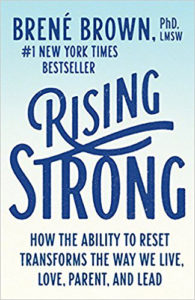Rising Strong: How the Ability to Reset Transforms the Way We Live, Love, Parent, and Lead
Random House Trade Paperback Edition
New York; 2017
Review by Laura Locke
I know we’ve all done it – gotten ourselves in a brain rut where we can’t stop thinking about a conversation that didn’t go the way we wanted. Or kept replaying an embarrassing incident over and over again in our mind, that even years later still makes us cringe. Perhaps a crushing event has caused you to make a vow to never, ever try that path again. How on earth do we get back up and move forward, when all our instincts tell us to curl up into a ball and hide?
 I recently read (and loved) Brené Brown’s book, Rising Strong, originally published in hardcover in 2015. A research professor at the University of Houston, she has spent the past two decades studying courage, vulnerability and shame. Her two previous books, The Gifts of Imperfection (2010) and Daring Greatly (2012), along with Rising Strong, were #1 New York Times bestsellers. You might also know her from her 2010 TED Talk on “The Power of Vulnerability” – one of the top five most viewed TED Talks in the world, with over 35 million views.
I recently read (and loved) Brené Brown’s book, Rising Strong, originally published in hardcover in 2015. A research professor at the University of Houston, she has spent the past two decades studying courage, vulnerability and shame. Her two previous books, The Gifts of Imperfection (2010) and Daring Greatly (2012), along with Rising Strong, were #1 New York Times bestsellers. You might also know her from her 2010 TED Talk on “The Power of Vulnerability” – one of the top five most viewed TED Talks in the world, with over 35 million views.
Rising Strong naturally extends the lessons from her earlier books. Some of the key ‘take-aways’ from her previous work, for me, are:
- Understanding the huge, positive consequences that can come from letting go of my worries about what others might think of me
- Seeing how my willingness to be open and vulnerable is a powerful catalyst for building deeper friendships with others
- Realizing how much more fulfilling and exciting my life is when I stop being ruled by my inner cautious voice, and instead make the choice to just “show up” as often as I can – even when there’s no guarantee of a good outcome
In Rising Strong, Brown takes a step further and addresses the rather unfortunate fact that if we live courageously, the chances are very good that we’ll make mistakes and sometimes fall flat on our face. And that can really, really hurt.
Then what?
Brown sets forth in this book to give us a process to not only navigate the challenging “big events” in our lives, like a business failure, or a life-changing illness, or the loss of a loved one – but also a way to navigate the “everyday hurts and disappointments”. I love the fact that she isn’t afraid to bring her own vulnerability to her writing, opening up about her personal mistakes, weaknesses and heartaches.
Extensive research led her to develop a three-step process to help us get through times when we are dealing with failure, loss, humiliation, and the difficult emotions that they dial up inside us:
The Reckoning: Walking into our Story – Recognize emotion, and get curious about our feelings and how they connect with the way we think and behave.
The Rumble: Owning our Story – Get honest about the stories we’re making up about our struggle, then challenge these confabulations and assumptions to determine what’s truth, what’s self protection, and what needs to change if we want to lead more wholehearted lives.
The Revolution: Write a New Ending to our Story – this one is based on the key learning from our rumble. Use this new, braver story to change how we engage with the world and to ultimately transform the way we live. (from page 37, Rising Strong)
Rising strong after a fall is how we cultivate wholeheartedness. Brown defines this way of life in one of her previous books:
Wholehearted living is about engaging in our lives from a place of worthiness. It means cultivating the courage, compassion, and connection to wake up in the morning and think, ‘No matter what gets done and how much is left undone, I am enough’. (pg. 10; Daring Greatly)
A critical piece for me in this 3-step process, and also for Brown, is moving from judgment (of myself and others) to curiosity. If we’re willing to explore and ask questions, rather than immediately leaping into old, negative patterns of behaviour, we might actually learn something new. We can travel beyond our usual knee-jerk responses, and get a better grasp on the ways our minds tend to work. That wisdom can lead us to find better, calmer, more loving and generous ways of engaging with others…and with ourselves.
Getting curious – instead of getting angry, resentful, jealous, or just shutting down –takes guts. It means we have to let go of some of our self-righteousness and try to adopt a very different attitude, one filled with uncertainty. It can lead to new epiphanies about ourselves, some of which might be rather painful to admit. But as Brown puts it, this approach has led her to adopt and live by the belief that ‘nothing is wasted’.
“There is a profound relationship – a love affair, really – between curiosity and wholeheartedness. How do we come to those ‘ aha’ moments if we’re not willing to explore and ask questions?” (pg. 52; Rising Strong)
A practical recommendation from Brown that made me laugh and also helped me gain self-awareness is the suggestion to write down our SFS’s (“shitty first stories”) after a bad experience. She adopted this idea from a suggestion to aspiring writers by author Anne Lamott to write down “first shitty drafts”, in which you “let it all pour out and let it romp all over the place, knowing that no one is going to see it and that you can shape it later.”) These stories that we scribble down are our raw “first take” on what has happened, filled with honest initial emotions. Brown encourages us to “wade through the sometimes-murky waters of whatever you’re thinking and feeling. You can be mad, self-righteous, blaming, confused.” She gives some examples of her own SFS’s, and they’re hilarious…and very revealing.
This exercise can really give us a glimpse into the strange places our minds tend to go when we’re embarrassed or upset. It then sets the stage for using our curiosity to evaluate what we’re thinking and feeling, and to question our assumptions and conclusions. The stories we make up about a difficult incident are so often based on incomplete information, bottled-up emotions, and strong emotional push-back in the moment.
I found myself recently writing my own SFS, after a particularly upsetting incident. After taking a break, I read it over again as objectively as I could – and had a good laugh at myself. Then, like a detective, I started to look for the places where I was pretty obviously off-base, or was shifting blame onto someone else.
I also started to search for the actual truth in the situation, while trying to consider the points of view of others. I realized that I needed to take more responsibility for my own actions, and I also thought deeply about the roots from which my faulty thinking patterns emerge. That’s “The Rumble”. As Brown puts it, “We can’t chart a brave new course until we recognize exactly where we are, get curious about how we got there, and decide where we want to go.”
The Revolution happens when we do our best to extend the most generous interpretations to the intentions, words and actions of others – and when we choose to make the assumption that those around us are doing the best that they can. We should continue to maintain boundaries where they’re needed, but we must also realize that it’s important to hold ourselves accountable for speaking our minds (respectfully), asking for what we need, and sharing our discomfort. Brown explains, “As miserable as resentment, disappointment and frustration make us feel, we fool ourselves into believing that they’re easier than the vulnerability of a difficult conversation. The truth is that judgment and anger take up way more emotional bandwidth for us.”
The book has a number of other ideas and strategies that I found very helpful. As well, Rising Strong is a really enjoyable read, with Brown’s penchant for self-revelation and great story-telling. It’s good medicine for the soul, and can help to heal our dysfunctional reactions to life’s struggles. Her research and fresh perspective go a long way to helping us develop true resilience and build deeper, more honest relationships – which in turn lead to healthier families and communities.
Be yourself. Be brave. Rise strong.









